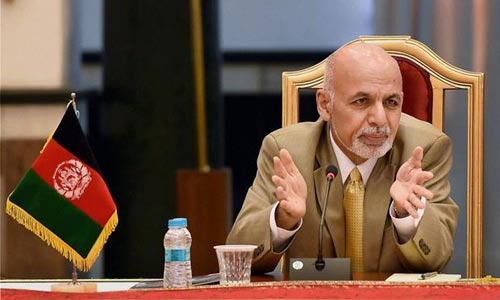Afghan government, especially the national unity government has played important role in changing Afghanistan from a dependent land-lock country to a land-link and bridging state by opening several new aerial and ground transit routes. The latest one was inaugurated last Sunday by President Ashraf Ghani and the first Afghan cargo was sent to India through Chabahar Port in Iran. Addressing a ceremony in Zaranj city, a western city in Nimroz province, Ghani said that with the opening of the Chabahar route, the country’s exports will increase from the current $1 billion to $2 billion until next year. He added that Afghanistan is not a landlocked country; it is the heart of Asia and Afghanistan is turning from an importer to an exporter country. “Today, Nimroz is turning from a deprived province into a key province,” Ghani said as he pointed out to the importance of the Chabahar Port for Nimroz. Meanwhile, Ghani directed the relevant institutions to start work on upgrading Nimroz from a third-grade province to a second-grade province.
The Initial discussions for the Chabahar project began In May 2016 when India, Iran, and Afghanistan signed a trilateral agreement on the establishment of a Transit and Transport Corridor among the three countries as a regional hub for sea transportation. Later in February 2018 Iran said it had agreed to lease operational control of Chabahar to India for 18 months and in June, India’s Union Minister Nitin Gadkari said India is trying to make Chabahar fully operational by 2019. The Indian ambassador Vinay Kumar said at the ceremony that Afghanistan’s exports to India have increased by 40 percent after the launch of air corridor between Kabul and New Delhi.
The first export shipment through new opened route contained 570 tons of dried fruits, textiles, carpets, and other goods carried by 23 vehicles, Afghan officials said. The consignment is to be shipped to the port city of Mumbai in western India. previously, most of Afghanistan’s imports and exports transited through Pakistan but Afghan business men always complained of challenges they faced in that country. The Chabahar project for Afghanistan was aimed to seek an alternative transit route and also make effort to build up Afghanistan’s economy and reduce dependence on foreign aid and put a major dent in the illicit opium trade that has been a major source of revenue for the Taliban insurgency.
The role of India in success of Chabahar port project was very important. In December 2018, the state-owned India Ports Global Limited (IPGL) formally took over operations at Chabahar Port. The port provides easy access to the sea for Afghanistan, and India ha developed this route to allow both countries to engage in trade bypassing Pakistan. Last year, India had sent 1.1 million tonnes of wheat and 2,000 tonnes of lentils to Afghanistan through Chabahar. In addition, they have also poured $2 billion into development in Afghanistan since the 2001 U.S.-led overthrow of the Taliban’s government.
Both Afghanistan and India established an air corridor in 2017. Afghan exports to India stood at $740 million in 2018, making it the largest export destination, officials said. Afghanistan plans to open other air corridors to send products to five countries, the ministry of commerce and industries said Wednesday, a move after the opening air corridors with India and Kazakhstan last year. “We are planning to open air corridors to Azerbaijan, Sri Lanka, the United Arab Emirates, Indonesia and Turkey this year,” said Mosafer Qoqandi, spokesman of the ministry. He called the air corridors important for the economic growth. “This is also important for us to know which products have good markets in these countries.”
Afghanistan is also exporting products to India and Kazakhstan through the air corridors made in 2017. The corridor to Kazakhstan is rarely used, but two corridors to India’s New Delhi and Mumbai are active in exporting Afghan goods to the Indian cities. Some Afghan traders say that the air corridors were costly and took more time to export their goods, but the chamber of commerce and industries calls them important to expand exports. Seyam Pasarlai, spokesman of the chamber said that most of the fresh fruit get rotten due to lack of proper warehouses, but the air corridors help the products be exported in a short time.“The air corridors cause more employment, we will get more commercial experiences, our commercial relations will increase that helps more political relations based on mutual benefits,” said Taj Mohammad Talash, a business expert.
. The geographical uniqueness of Afghanistan is that it borders with six countries and also has river ports. Very few countries of the world have this kind of strategic opportunity. From this point of view, Afghanistan has tremendous potential to develop its economy. But economic development cannot be achieved without a sound transport infrastructure, in which regard Afghanistan was very deficient and dependent. The country need to develop new road and rail infrastructures and also strengthen the existing ones. The border countries have business interests not only with Afghanistan but also among themselves. If the border countries want to establish ground connectivity between them, they are obliged to operate through Afghanistan. So development of transport infrastructure in Afghanistan is not only important for its own economy, but also for the neighboring countries as well.
In addition, Afghanistan has potential to develop its tourism sector but currently the internal situation does not favor in this regard. As much as the land link programs become operational, firstly internal and eventually external tourism will develop in the country. Tourism will not only boost the economy of the country, but will also help normalization of the internal situation.
Home » Opinion » President Ghani: Afghanistan is no more A Landlocked Country
President Ghani: Afghanistan is no more A Landlocked Country
| Mohammad Zahir Akbari

